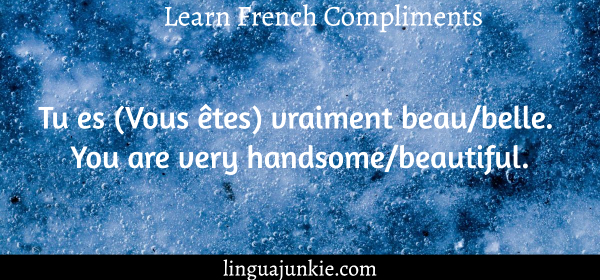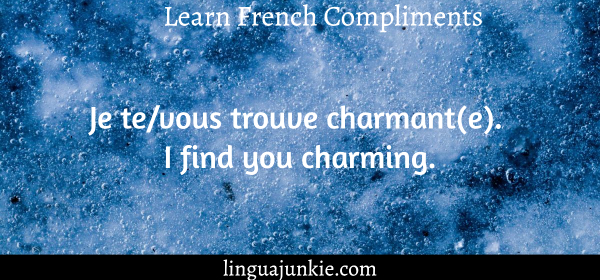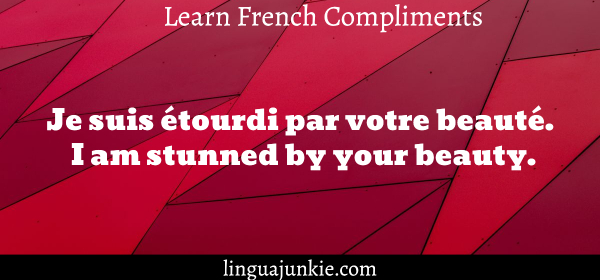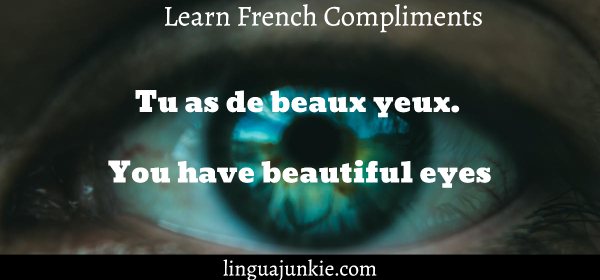Want to learn French compliments?
Well then…
1. Vous êtes intelligent! You’re Smart.
What’s that mean? It means, “You’re smart,” and now you know one French compliment.

But, there’s more.
In this guide, you learn 16+ easy French compliments. Why? So you can speak more French and impress natives.
So, let’s move on.
By the way, if you want to learn and hear real French pronunciation, play this audio lesson by FrenchPod101.com (a popular French learning program). You’ll learn French greetings.
2. Tu es (Vous êtes) vraiment beau/belle. You are very handsome/beautiful.
- Pronunciation: TO-AY (VOOZ-ETTE) VRAY-MOHN BOW/BELL.
How do you say “you are beautiful” in French?
This is how. Or, handsome.
Tu es is the informal form of you are, so this would be used with a person of a similar age or peer group. Vous êtes is the formal form of you are, so this would be used with someone with whom you are less familiar or someone older than you. Vraiment is the word really and can be used to emphasize an adjective or can work as a question, just like in English (Vraiment?)
Beau is the adjective beautiful in the masculine form, so this is usually translated as handsome.
Belle is the feminine form, so this means beautiful to describe a woman.

Now you know how to say “you’re beautiful” in French or “you are handsome” in French.
This may be one of the most important French compliments to know.
Now, what’s next?
3. Je te/vous trouve charmant(e). I find you charming.
- Pronunciation: JHUH TUH/VOO TROOV SHAR-MAHN(T)
Literally, the order of this sentence reads I you find charming.
The “you” is te when used informally and vous when used formally. The verb trouver means to find as in, you believe this person is this way or the literal meaning of discovering something you were looking for. If someone is impressed with another person’s personality, they might use this expression.

4. Je suis étourdi par votre beauté. I am stunned by your beauty.
- Pronunciation: JHUH SWEE AY-TO-UR-DEE PAR VO-TRUH BOW-TAY
Étourdi can mean absent minded, dazed, stunned, and giddy depending on the interpretation.
Basically, you are overcome by this person’s beautiful appearance in such a way that it takes your breath away or shocks you in a positive way.

5. J’aime ton sourire. I like/love your smile.
- Pronunciation: JHAM TON SU-REAR
J’aime can mean I like or I love. It can be used to form many compliments by switching out the noun ton sourire for any other item you want to compliment.
For example, J’aime ta cravate means I like your tie. J’aime ta robe means I like your dress.

6. Tu as de beaux yeux. You have beautiful eyes
- Pronunciation: TO-AS DUH BOWZ-YUH
Tu as is the informal form of you have. It is followed by the plural adjective for beautiful, beaux. You can substitute the noun de beaux yeux with any other thing you want to describe as beautiful. Tu as une belle maison would tell someone, “You have a beautiful home.”

If you want to compliment more than one person, you would use the plural form, vous avez. For example, Vous avez de beaux enfants means you (both of you) have beautiful children.
7. Bon travail! Good work!
- Pronunciation: BOHN TRUH-VI
If a student does well on an essay, the teacher might write this compliment at the top of their assignment.
It is also a common expression if someone does well on a specific task. A person might look at a piece of art they like and tell the artist, Bon travail! Bon is the masculine form of good.
8. C’est génial! That’s/It’s great!
- SAY JHAY-NEE-AL
Génial can be interpreted as great, fantastic, or brilliant. Anything can be described as génial, but it is often used to talk about an idea or a situation. C’est génial can be used to describe something that younger people would call cool or awesome in English. French people will sometimes just say C’est cool!
9. Bonne idée! Good idea!
- Pronunciation: BUN E-DAY
If someone offers up a great suggestion, this expression is a perfect response. Bonne is the feminine form of bon.
10. C’est délicieux! That’s/It’s delicious!
- Pronunciation: SAY DAY-LEE-SEUH
This is the perfect compliment for a chef or a nice way to describe a yummy meal someone is currently eating. Anytime something tastes really good, this is a great expression to use.
11. J’en ai l’eau à la bouche. It makes my mouth water.
- Pronunciation: JHAHN AY LOW AH LA BOOSH
This is another way of complimenting food. This idiom literally translates as I have some water in my mouth. This expression means that the food is so delicious or looks so delicious that it is making you salivate. It is used less often than C’est délicieux.
12. Félicitations! Congratulations!
- Pronunciation: FAY-LEE-CEE-TAH-SEE-OHN
If someone experiences something good in their life, you compliment them by using this expression. It is commonly used for births and weddings.
13. Chapeau! Congratulations!
- Pronunciation: SHAH-POH
This can be used anytime to say congratulations. Chapeau literally means hat, so this expression is as if you are tipping a hat to someone for a job well done.
14. Bravo! Well done!
- Pronunciation: BRAH-VOH
Bravo is commonly used by English speakers to express a compliment to a performer after their performance. This term is used in French similarly for performances, but it is also commonly used to tell someone they have done a good job in any situation. After completing a strong work presentation or making a good point, a coworker might compliment another coworker with a Bravo!
15. Je suis fier/fière de toi. I am proud of you.
- Pronunciation: JHUH SWEE FEE-AY/FEE-AIR DUH TWAH
This is a common expression used when someone does something admirable. Fier is the masculine form of proud, so this is what a male would say regardless of who the recipient of the compliment is. A woman would use fière no matter who is receiving this compliment.
16. Tu es le/la meilleur(e)…du monde. You are the best…in the world.
- Pronunciation: TO-AY LUH/LAS MAY-YUR … DO MAHND
This is a superlative expression that can use a variety of nouns. For example, Tu es le meilleur danseur du monde means You are the best dancer in the world. You use le meilleur to describe a male. La meilleure is used to describe a female. Some common nouns that can be used with this expression include: joueur/joueuse (player), ami/amie (friend), and athlète (athlete).
Know of any other good French compliments?
Leave a comment!
– The Main Lingua Junkie
